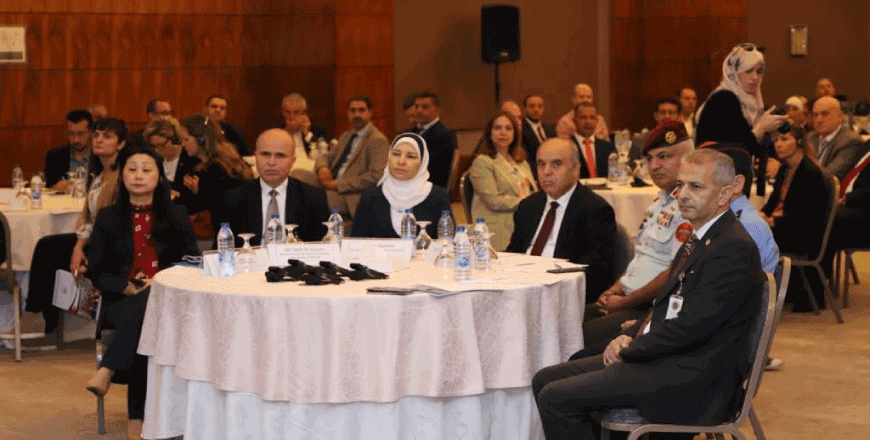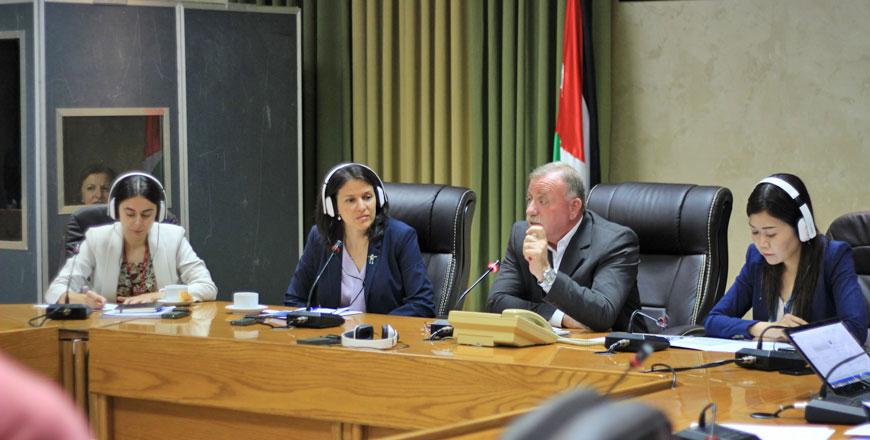You are here
Education Ministry launches Crisis and Risk Management Strategy with UNESCO support
By JT - May 21,2023 - Last updated at May 21,2023

Education Minister Azmi Mahafzah, UNESCO Representative to Jordan Min Jeong Kim and guests during the launch ceremony of the Crisis and Risk Management Strategy for the Ministry of Education on Sunday (Photo courtesy of UNESCO)
AMMAN — Minister of Education Azmi Mahafzah on Sunday launched the Crisis and Risk Management Strategy for the Ministry of Education in Jordan (2023-2027) marking an important step towards strengthening the education sector’s response to crisis.
The Crisis and Risk Management Strategy aims to ensure that the Ministry of Education can guarantee a safe and secure educational environment and continuity of quality education in the face of the different risks and hazards facing Jordan, according to a UNESCO statement.
The strategy focuses on addressing the risks posed to education in Jordan by identifying key system-wide strategic actions to ensure that education actors, including schools and students, can develop a localised and decentralised approach to crisis and risks management.
The strategy was developed with the technical support of UNESCO and its International Institute for Educational Planning (IIEP) through an extensive Kingdom-wide consultative process.
It is aligned with Jordan’s Natural Disaster Risk Reduction Strategy (2023-2030) developed by the National Centre for Security and Crises management (NCSCM). It is also anchored in the Ministry’s Education Strategic Plan (ESP) 2018-2025 with crisis and risk management as an enabler of system strengthening to ensure inclusive and equitable quality education for all.
Min Jeong Kim, UNESCO Representative to Jordan, congratulated the Minister of Education for the development of the Strategy. “Once again, Jordan has demonstrated its commitment to ensuring that all children and youth can exercise their right to education. By institutionalising crisis sensitive planning, the Ministry is paving the way for a more resilient, efficient and responsive education system for the Kingdom.”
“Risk Management is a regional and international priority, and requires strengthening of national policies, strategies and plans in line with international frameworks such as the Sendai Framework for Disaster Risk Reduction. This is what the Ministry of Education has successfully achieved” said Saleh Al Sheyyab, Director of Strategic Planning from the NCSCM.
Mahafzah thanked UNESCO and IIEP for their support in the development of the strategy and stressed the importance of partnerships at all levels as a key pillar for crisis and risk management.
“Thanks to the support of our partners in this important area, and in cooperation with the NCSCM, the Ministry of Education will be able to further ensure that it can meet its commitments towards ensuring the delivery of quality education during crisis. This is part of our government priorities, including in our ESP and Economic Modernisation Vision,” he said.
In addition to the launch of the Strategy, the Education Ministry, also with UNESCO/IIEP support, has recently established for the first time a Risk Management Unit, which will have central role in the implementation of the Strategy. The unit, alongside key ministry officials, is already working on a costed-operational plan.
The support provided to the Education Ministry for crisis sensitive planning is part of UNESCO’s ongoing technical assistance being provided to the ministry under the System Strengthening Partnership (SSP), currently being implemented under a Multi-partner Trust Fund (MPFT) supported by Canada, the Italian Agency for Development and Cooperation (AICS), Norway, and Switzerland.
Representatives from the NCSCM, the National Centre for Cybersecurity, and key education sector partners and stakeholders attended the event.
Related Articles
AMMAN — Key education stakeholders in Jordan, ministry staff and UN partners participated in a workshop held in Amman from October 17 till 2
AMMAN — The Ministry of Education successfully concluded a two-day policy dialogue with partners and national stakeholders to assess progres
AMMAN — Personnel at the Ministry of Education (MoE) on Sunday began undertaking a technical training on monitoring, evaluation and reportin


















